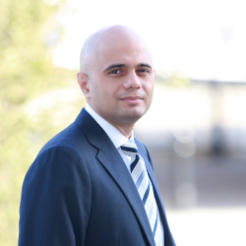The cost to the Exchequer of unlinking the gift aid small donations scheme from gift aid would be around £30m, said the HMRC at a public committee meeting yesterday.
Andrew Edwards, head of charities at HMRC, joined Sajid Javid, Economic Secretary to the Treasury and Sam Anderson, also from the Treasury, in addressing the 19-member committee which will decide on amendments to the Small Charitable Donations Bill before it is read in Parliament, expected to take place by Christmas.
After questions from the panel surrounding the necessity of the requirement in the Bill for charities to have at least three years' history of processing successful gift aid payments in order to qualify to benefit from the scheme, Javid advised that in creating the Bill the cost to the Exchequer, as well as the cost of fraud, "is something we clearly need to manage".
Asked what the cost to the Exchequer would be if this requirement were removed, Anderson advised the estimate was that it would be "tens of millions". "From memory, it was something like up to £30m," said Edwards.
The panel did not let it rest there. A further question was asked about the decision to require three years, rather than two years of successful gift aid claims.
"The difference between three and two is not just fraud," said Javid. "There is a difference in terms of the cost to the Exchequer as well. But we look at both the cost to the Exchequer of the scheme being more generous, but also at the potential increase in fraud. It was our judgement that when you put the two together that the right balance was three years."
The matter of fraud measures was one of great contention by other members addressing the panel. During the session Peter Lewis, Insitute of Fundraising chief executive, said that the Big Lottery Fund's Awards for All programme is a higher fraud risk than GASDS - at 0.1 per cent - yet has a much simpler application process. CFG's Caron Bradshaw said that the scheme would require small organisations to keep a huge audit trail and that they "just wouldn't do it"
Alternative fraud prevention measures should be explored
Charity representatives presenting to the panel said that HMRC should consider alternative eligibility criteria to prevent fraud. The National Trust suggested linking claims to occupation at premises for more than three years.
However charities presented a picture that fraud had not been an issue at their organisations. The National Trust advised that nothing had ever been brought to its attention in terms of fraud via the gift aid it currently claims from subscriptions and memberships. Television and radio charity WaveLength said simply that the GASDS measures were "overkill". While the RNLI advised that it had seen eight or nine cases relating to fraud in the past 18 years, three of which were investigated and all turned out to be administrative errors.
Nonetheless, Edwards advised that the HMRC stopped £10m of fraudulent gift aid claims last year, and a further £30m in incorrect claims. £1bn was paid out to charities in gift aid last year.
Javid further explained that the strict requirements are to prevent individuals setting up multiple organisations in order to take advantage of the scheme. One organsiation that was caught tried to set up 189 charities last year, Edwards advised.
But the IoF's Peter Lewis was not convinced. Upon leaving the session he tweeted: "GASDS: my impression from this afternoon is that the whole complexity is purposeful to work within a fixed budget rather than prevent fraud".









